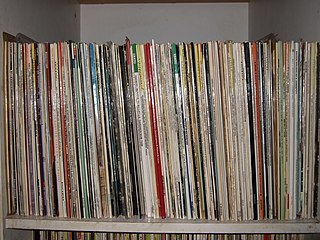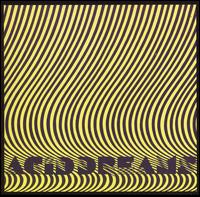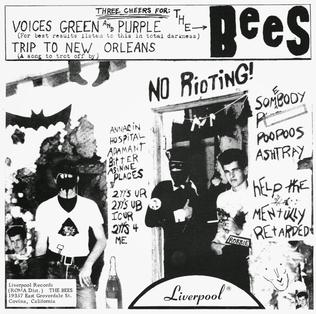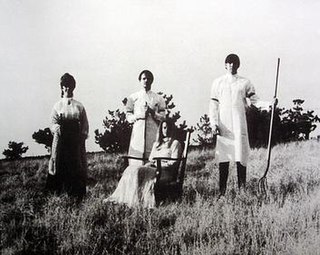
More is the third studio album and first soundtrack album by English rock band Pink Floyd. It was released on 13 June 1969 in the United Kingdom by EMI Columbia and on 9 August 1969 in the United States by Tower Records. The soundtrack is for the film of the same name, which was primarily filmed on location on Ibiza and was the directorial debut of Barbet Schroeder. It was the band's first album without former leader Syd Barrett.

Record collecting is the hobby of collecting sound recordings, usually of music, but sometimes poetry, reading, historical speeches, and ambient noises. Although the typical focus is on vinyl records, all formats of recorded music can be collected.

Mass in F Minor is the third studio album by American rock band The Electric Prunes, released in 1968. It consists of a musical setting of the mass sung in Latin and Greek and arranged in the psychedelic style of the band, and was written and arranged by David Axelrod.

Just Another Diamond Day is the debut album by the English folk singer-songwriter Vashti Bunyan, and was released on Philips Records in December 1970. Much of the album is a musical reflection on Bunyan and travelling partner Robert Lewis's experiences while travelling by horse and wagon through Scotland in 1968. It highlighted Bunyan's vocals with minimal instrumental accompaniment that was arranged by contemporary musical artists supervised under record producer Joe Boyd.

Record Collector is a British monthly music magazine. It was founded in 1980 and distributes worldwide.

Freedom Suite is the fifth studio album by rock band The Rascals, released on March 17, 1969. It peaked at number 17 on the Billboard Top LPs chart and also reached number 40 on the Billboard Black Albums chart, the last Rascals album to appear there.

Groovin' is the third album by rock band The Young Rascals. The album was released on July 31, 1967 and rose to #5 on the Billboard Top LPs chart and number 7 on the R&B chart. Eight of the songs were released on singles with the title track reaching number 1 on the Pop chart in the U.S.

The Cheerful Insanity of Giles, Giles and Fripp is a 1968 album from the English group Giles, Giles and Fripp. The music shows a varied mix of pop, psychedelic rock, folk, jazz and classical influences. The songs on each LP side are connected with comedic spoken word pieces, "The Saga of Rodney Toady" and "Just George", which tell stories.
Tinkerbells Fairydust were a British pop group in the late 1960s, who hailed from east London. They recorded three singles and one album for the Decca label.

Acid Dreams is an unofficial compilation album of American acid rock, garage rock and psychedelic rock songs recorded in the 1960s. It was originally produced in 1979 by a German record shop owner, inspired by Elektra Records' Nuggets series

The Zodiac: Cosmic Sounds was a collaborative concept album on the theme of the signs of the Zodiac. It was issued by Elektra Records in May 1967 and featured early use of the Moog synthesizer by Paul Beaver, with music written by Mort Garson, words by Jacques Wilson, and narration by Cyrus Faryar. It has been variously described as "a wonderful period piece" and "apt to inspire more giggle fits than stoned, pull-the-shades-down reveries"

Triangle is the fourth studio album by American rock band The Beau Brummels. Produced by Lenny Waronker and released in July 1967, it was the band's first album to include songs that vocalist Sal Valentino and guitarist Ron Elliott composed together. The band incorporated fantasy elements and surreal characters into the album's song titles and lyrics, and worked with a variety of session musicians to create Triangle's psychedelic musical style. The Beau Brummels were reduced to a trio—Valentino, Elliott, and Ron Meagher—at the time Triangle was recorded, as former group members Don Irving (guitars) and John Petersen (drums) left the band following the release of the group's previous album, Beau Brummels '66.

H. P. Lovecraft II is the second album by the American psychedelic rock band H. P. Lovecraft and was released in September 1968 on Philips Records. As with their debut LP, the album saw the band blending psychedelic and folk rock influences, albeit with a greater emphasis on psychedelia than on their first album. H. P. Lovecraft II failed to sell in sufficient quantities to reach the Billboard Top LPs chart or the UK Albums Chart, despite the band being a popular act on the U.S. psychedelic concert circuit. Legend has it that the album was the first major label release to have been recorded by musicians who were all under the influence of LSD.

Calling on Youth is the debut studio album by English punk rock band the Outsiders, led by vocalist/guitarist Adrian Borland, who would go on to form the Sound. It was released in May 1977 by record label Raw Edge.

"Voices Green and Purple" is a song by the Bees, an American garage rock and psychedelic band from Covina, California who were active in the mid-1960s. It has been mentioned as an innovative example of early protopunk and has become highly prized by various garage rock collectors and enthusiasts.
Creation of Sunlight was an American psychedelic rock band formed originally as a cover group in Long Beach, California, in 1968. Though much of the group's history was initially unknown—even their name was obscured—overtime they have come to the attention of psychedelic music enthusiasts for their sole album, which was released in 1969. The Creation of Sunlight's sound incorporated different aspects of their California contemporaries, such as the cheery nuance of sunshine pop and harder-edge acid rock.

Music Emporium was an American psychedelic rock band formed in Los Angeles, California, in 1967. Fronted by experimental multi-instrumentalist Bill "Casey" Cosby, the group was created at UCLA, and developed a sound centered around Cosby's keyboards and vocal harmonies. Music Emporium released one ultra-rare self-titled album in 1969, which is praised among psychedelic enthusiasts and has been re-released multiple times.

Psychotropia is the debut album by English psychedelic musician Nick Nicely, first released as an LP by Tenth Planet in 2003 and as a CD by Castle Music in 2004. Nicely had started fusing psychedelic and electronic music in the late 1970s, and in the early 1980s he released two singles, "DCT Dreams" and "Hilly Fields (1892)". While the singles were critically acclaimed, they were commercial failures, which partly contributed to Nicely's retirement from the public eye shortly after. While his works were being praised by several of his contemporaries, he continued to record material into the mid-1980s, and then again in the late 1990s.
















